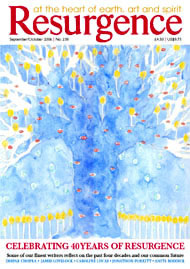HERE ARE TWO books about life and work on an Italian hill farm in Umbria, written from the perspective of an English woman and a Swiss man who have, over the course of the last twenty years, become ‘new peasants’: that is, people whose lives are “hard, intense, intimately dependent on and bound up with their place.”
I first came across Etain Addey in the 1980s through her lively accounts of home education in the Education Otherwise newsletter. When the Small School wanted to visit Italy, I contacted her to see if she could offer board and lodging in return for help on the farm; thus it came about that a party of students and teachers spent a memorable week combining visiting medieval Italian towns with work in the olive groves and the kitchen. It allowed me to experience at first hand eating grapes from the vine, tasting the wine, olive oil and homemade cheese, and meeting the animals, including the old patriarch donkey Otello. An extraordinary quality of life has been created there by Etain, her partner Martin Lanz and their children and animals, and the many visitors and friends who have passed through.
Etain writes: “We feel enormously blessed with good things – trees we sowed ourselves, that are now tall, cover us with shade and fruit, animals whose grandparents were born here share our days, friends who shared our work fifteen years ago come back and their children, who rolled down the hills as babies, come back with rucksacks and chop wood and tell us their stories…this life has everything worth having: beauty around us, real work and real food and good friends to share it with.”
The books do not, however, paint rose-tinted or idealised portraits; Martin’s simple unadorned stories of working in partnership with the animals, and Etain’s vivid accounts of earthquakes, births, deaths and difficult visitors are earthy, even salty, with many exclamation marks echoing the fluent and expressive Italian original version; yet there is magic, myth (this is the valley where St Francis made friends with the wolf of Gubbio) and poetry – poets are frequent visitors – and the life of the imagination is as vibrantly set before the reader as the farming year, with its endless cycles of delights and disasters.
The books are full of profound attention to, and recognition from, the natural world: “No-one can live in a place without it living in them.” By carefully listening to neighbours’ stories and folk tales, by respecting local tradition and customs, and above all by listening to and learning from the place itself with its stones and soils and diverse plant and animal life, a deep and authentic understanding is born. Etain watches the sheep as they graze, and notices how they never eat all of a plant, but always leave some so it can regenerate; and people say sheep are stupid …
There is in these books a sense of belonging that those of us without roots, brought up in a world of ‘privilege’, can only marvel at. It is still present in a way in the older indigenous inhabitants of rural areas, but they themselves are an endangered species; their deep knowledge of their locality is not valued and is being lost faster than we can record it. Sadly, we feel we need to travel across the globe looking for ‘real’ people with “lives honed by necessity and tradition, ways of living shaped by place, ‘intact’ cultures”. The message of these books is that we can choose to live with less, be downwardly mobile, and, says Martin, “find real satisfaction and [experience] a lot of intense feeling, which I think are the gifts of poverty”.
Choosing to live without the dubious devices of the industrial age means to Martin “spending time in the quiet with a friendly and intelligent animal” rather than riding up and down on a fuel-hungry and noisy tractor.
Washing by hand, for Etain, after the drily recounted short-lived experiment of the bicycle-driven washing machine, is an opportunity to meditate, enjoy the feel of water and soap, and clear the mind at the same time as cleaning the clothes.
Rural communities across the globe are facing change from influences beyond their control; yet there are underground movements mobilising to challenge those impersonal and pernicious forces. Etain and Martin are part of a local network of ‘new peasants’ who organise markets for exchange of produce, help each other out at harvest time and celebrate together. They are re-creating a community life and a way of living lightly on the land which have been largely lost, but can be rediscovered – and there are others all over the world doing the same thing.
Here is the best account yet of a serious endeavour to ‘live well in a place’, a million miles from the shallow and cheap ‘Year in Provence’ or ‘My house in Tuscany’ sagas.
How much less air travel and how much more joy in the world might there be if we acted on Voltaire’s famous counsel: ‘Il faut cultiver notre jardin’ or truly understood the advice from a more recent poet and philosopher, Gary Snyder: “the most radical thing you can do is stay at home”?
Caroline Walker taught for many years at the Small School in Hartland, and is now working on rural regeneration projects in Devon.








